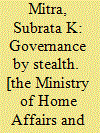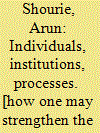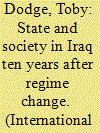| Srl | Item |
| 1 |
ID:
190566


|
|
|
|
|
| Publication |
New Delhi, Oxford University Press, 2021.
|
| Description |
xxv, 476p.: figures, tableshbk
|
| Standard Number |
9780199460489
|
|
|
|
|
|
|
|
|
|
|
|
Copies: C:1/I:0,R:0,Q:0
Circulation
| Accession# | Call# | Current Location | Status | Policy | Location |
| 060379 | 954.04/MIT 060379 | Main | On Shelf | General | |
|
|
|
|
| 2 |
ID:
085170


|
|
|
|
|
| Publication |
New Delhi, Viking, 1990.
|
| Description |
x, 239p.pbk
|
| Standard Number |
0670837873
|
|
|
|
|
|
|
|
|
|
|
|
Copies: C:1/I:0,R:0,Q:0
Circulation
| Accession# | Call# | Current Location | Status | Policy | Location |
| 032708 | 320.954/SHO 032708 | Main | On Shelf | General | |
|
|
|
|
| 3 |
ID:
121625


|
|
|
|
|
| Publication |
2013.
|
| Summary/Abstract |
Despite having transitioned to democracy, the governments of many developing countries still deliver poor public services as measured by social outcome indicators. Recent literature frames these issues of governance and public service delivery as a two-part principal-agent problem: civil servants are the agents of politicians and politicians are themselves the agents of the voters (Olken and Pande 2011). Much of this literature explores the determinants that drive citizens to demand better services (Pande 2011). Less attention, however, has been paid to understanding the behavior of the agents themselves and the interventions that can lead local politicians and civil servants to deliver better services.
|
|
|
|
|
|
|
|
|
|
|
|
|
|
|
|
| 4 |
ID:
119444


|
|
|
|
|
| Publication |
2013.
|
| Summary/Abstract |
This article examines the rise of a new authoritarianism in Iraq ten years after the invasion that removed Saddam Hussein. It traces the centralization of political and coercive power in the hands of Iraq's Prime Minister, Nuri al-Maliki. From his appointment in 2006, Maliki successfully moved to constrain the power of parliament and the independent agencies set up by the American-led occupation to oversee the state. He removed key politicians and civil servants who stood in his way. This authoritarian centralization reached its peak with Maliki's control of Iraq's special forces, its army and its intelligence services.
The article analyses the civilian institutions of the state, concluding that political corruption has greatly hindered their reconstruction. The result is an Iraqi state with an over-developed armed forces, very weak civilian institutions and a dominant prime minister. Against this background, the sustainability of Iraqi democracy is in question. The article concludes by assessing the ramifications of Iraq's postwar trajectory for military interventions more generally.
|
|
|
|
|
|
|
|
|
|
|
|
|
|
|
|